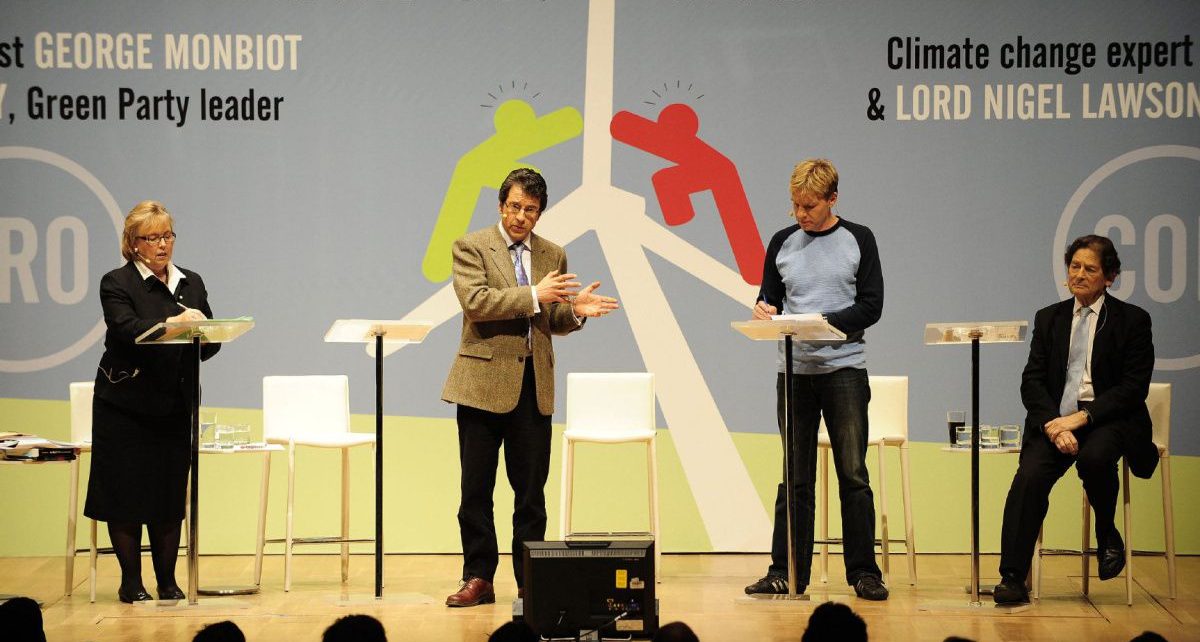When a panel of climate change skeptics held court at Ideacity, a TED Talk-like conference produced by Zoomer Media’s Moses Znaimer, some took aim at the ideological conference for giving fringe views a stage and a spotlight.
About 97 per cent of climate scientists agree that humans caused global warming, also known as anthropogenic climate change. While that near-unanimous position has been adopted by policy makers across the globe, it was totally absent from the segment of Ideacity devoted to contrarian thinkers.
That panel included people known for holding views contrary to the majority of scientists: Patrick Moore, a co-founder of Greenpeace who now says there is “no scientific proof” that man has caused global warming; Lord Nigel Lawson, a former U.K. politician and noted climate-change skeptic; and Alex Epstein, a political theorist and corporate speaker who is in favour of fossil fuels.
Moore, who calls anthropogenic climate change a “hypothesis,” defended the panel and praised Znaimer for being “open-minded” and hosting speakers who he said are often not given their due.
“The media has not told the story, and my job these days . . . I am taking this on as my personal challenge,” Moore said.
Znaimer, the owner of Zoomer Media and host of Ideacity, says that he picked those speakers precisely because they would spark debate.
“Why wouldn’t I put on stage a range of views? I’ve hosted the other side, often. Generally speaking I’m not a big fan of conventional wisdom or political correctness; besides, nobody needs me/us to do more of the same,” he wrote in an email.
Ideacity is comprised of mini-lectures from speakers who are notable in their field; the speeches are meant to spark dialogue, not necessarily present facts. But while featuring all sides of an issue is a hallmark of good journalism and can make for great TV, many in the scientific community feel that the media — be it a talk show or newspaper report — should do a better job of separating facts from opinions.
Bad Science Watch, a Canadian organization promoting “sound science when making important societal decisions,” called the Ideacity panel out for not featuring a single climate scientist.
“If it’s only one side . . . it’s just an infomercial for climate denial,” said Michael Kruse, who is on the board of Bad Science Watch.
“All science is uncertain,” he said. “But to use that as a way to divide the public, and make them fear institutions, is just maddening.”
Patchen Barss, a science journalist who attended the conference, took umbrage with the fact that when the speakers were introduced, they were heralded as thinkers who push boundaries.
“For scientists, and people like me who talk to scientists for a living, it’s maddening when crackpot dresses up as contrarian,” Barss tweeted.
Science is not like politics or art, Barss later told the Star — every opinion is not worthy of debate. When an idea, such as anthropogenic climate change, is almost unanimously agreed upon, it’s irresponsible to present minority viewpoints as equally valid, Barss said.
“Climate denial is a fact-free argument,” Barss said.
“Opinions that are worth engaging with are also based on fact.”
It’s not the only Canadian media platform to make space for climate skeptics.
Jonathan Kay, the National Post’s former opinion editor and current editor-in-chief of The Walrus, says that while there was no mandate to promote climate skepticism at thePost, Terry Corcoran, the longtime editor of the Financial Post’s comments pages, was a die-hard climate change skeptic who attracted similarly-minded writers, such as columnist Lawrence Solomon.
“Because the Financial Post is (to my knowledge) the only North American broadsheet newspaper franchise that consistently publishes material that is directly at odds with peer-reviewed climate science, it has become what is in effect the unofficial lay journal of alternate-reality climate bafflegab,” Kay wrote to the Star in an email.
Kay does not share these views, and wrote as much while he was at the National Post. Although his beliefs clashed with colleague Corcoran’s, he said they remain friends.
“One of the great things about working at the NP was the way the editors always would let all sides have their say, even if it meant stepping on the toes of prominent columnists. That commitment to debate remains a hallmark of the newspaper,” Kay wrote.
The Star’s own stance on the topic has ruffled some feathers. Kathy English, the Star’s public editor, gets messages from time to time from climate change skeptics who feel their viewpoints are not expressed in the paper’s coverage of the issue.
But English cautions that given the overwhelming consensus on the subject, continually getting the other side of the climate change debate would lead to a “classic case of ‘false balance,’” and give readers the impression that both viewpoints are equal.
The CBC has a similar policy.
“Whenever there’s a controversial subject . . . we accept that it’s our job to ensure that all kinds of views are presented respectfully, but we take into account how relevant they are to the debate and how widely held the views are,” said Jack Nagler, the director of journalistic public accountability and engagement at the CBC.
Nagler said there is no ban on alternative viewpoints, but they should not be given “50/50” coverage.
“When it comes to climate change there’s a pretty strong consensus among mainstream scientists that climate change is a reality, so you see that in our coverage,” Nagler said.
Just because the majority of scientists agree that man is causing climate change, doesn’t mean that there is no room for debate on the subject.
Both Kruse and Barss said there is still a need to discuss, in the media and in scientific literature, the long-term effects of climate change — and the best way to mitigate it.
“Doubt is important, it’s a foundation of science as well, but it has to be informed doubt,” Kruse said.






